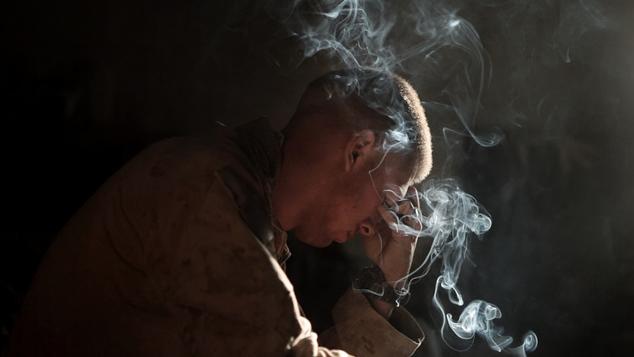Conflict | Reportage / Joint UK Premiere
Showing @ George Square Theatre, Sat 25 June @ 19:50 & Sun 26 June @ 16:00
Danfung Dennis / USA, UK, Afghanistan / 2010 / 88 min
Vaughan Smith / USA / 2011 / 25 min
Danfung Dennis’s debut feature film of life as a U.S marine in Afghanistan is an imposing depiction of modern warfare. Bearing the signs of pioneering freewheeling cinematography, Dennis graphically realises foreign conflict with a visual lucidity reminiscent of the late Tim Hetherington’s Restrepo. Screening alongside Vaughan Smith’s short Blood and Dust, both films capture the groundlevel and airborne missions undertaken by the marines, but where Smith peers into the life of the helicopter medics who rescue injured soldiers, Dennis focuses hard on the gritty clashes between U.S forces and Afghan rebels. As he follows Marine Sgt. Nathan Harris’s Echo Company in southern Afghanistan, the documentary jumps back and forth between the company’s attack on Taliban forces and Sgt. Harris’s post-war adjustment after being shot in the hip.
An interesting cyclical irony stirs beneath the veneer of this film: as Sgt. Harris claims he’d rather be back in Afghanistan than have to deal with hunting for car-parking spaces, the knowledge that it’s because of consumer corporations that he is fighting this war is absent. So for the viewer, this knowledge is both maddening and infuriating as the soldiers stationed in rural Afghanistan genuinely believe they are fighting for a just cause. And this is the real tragedy of the whole issue, stretching of course not just to conflict in Afghanistan and Iraq but to wars for centuries based on imperial rule, whether political or commercial.
There’s a hinging shortcoming about the documentary however: the clarity and crispness of the filming cinematises the action, which makes it feel like a Hollywood movie, yet this clashes against the vivid realisation of events which we know are factual. So it houses a de-sensitisation associated with action-movie narratives and threatens to undermine the footage while also facilitating the westernised good/bad dichotomy promoted by the marine captains who want to ‘defeat the enemy’.
And yet, Dennis seems aware of this dichotomy as a kind of dramatic irony, where frequent conversations with Afghan shepherds and farmers expose the ignorant and colonial intervention of U.S troops. This really is how the documentary should be viewed: cast against the backdrop of an infrastructurally weak society, the soldiers use the land as a simple battleground forcing the local families to live by the river, leaving their homes and livelihoods open to ruin. These ironies, controversies, depictions cause open debate and antipathy which any good documentary should do; coupled with Dennis’s inventive camerawork this documentary is a valuable and worthwhile addition to the reportage mosaic and suggests a promising future for Dennis.


Comments